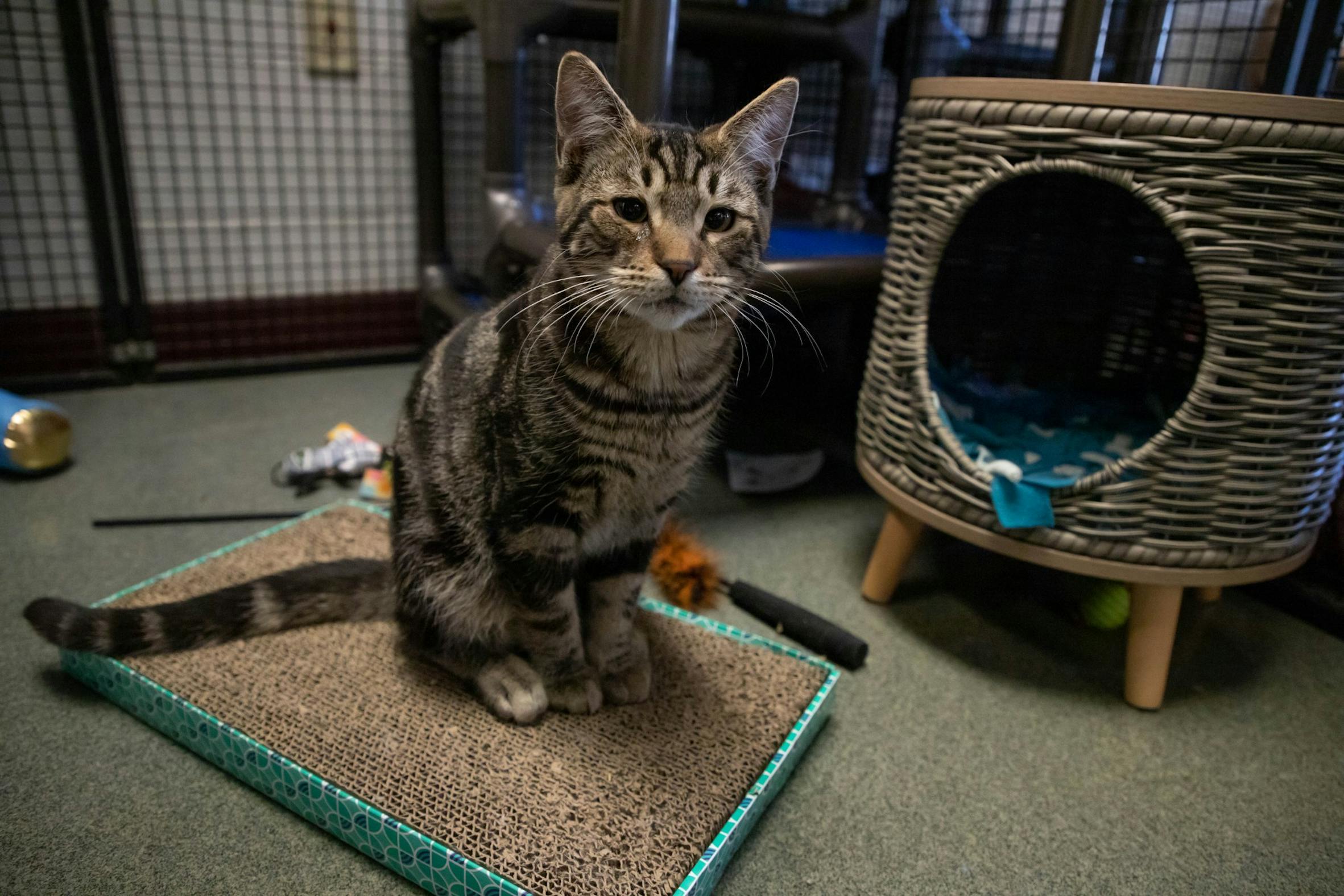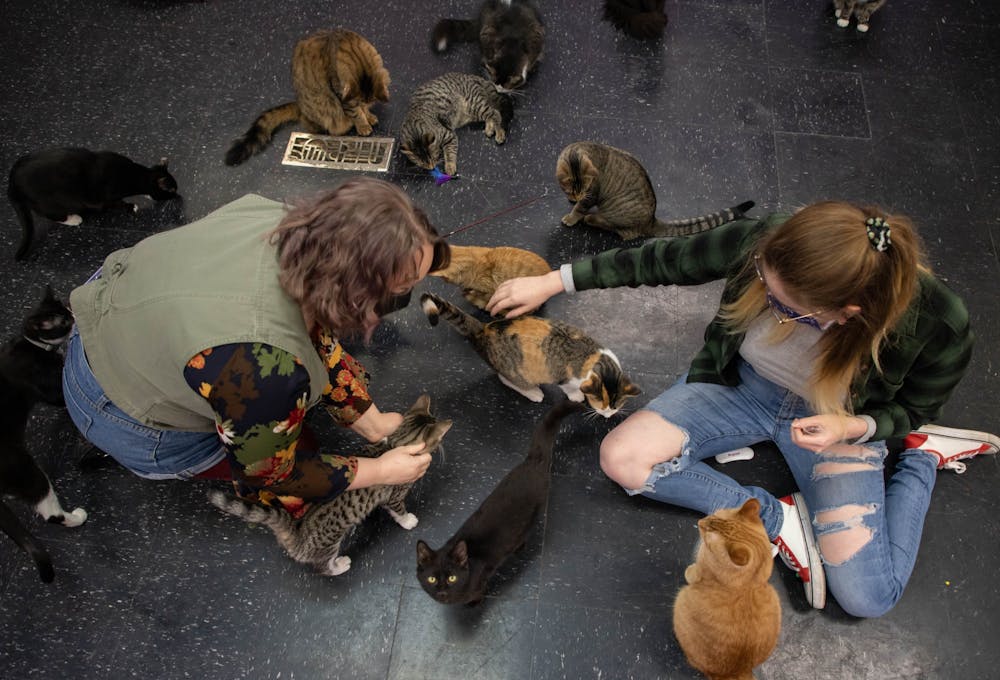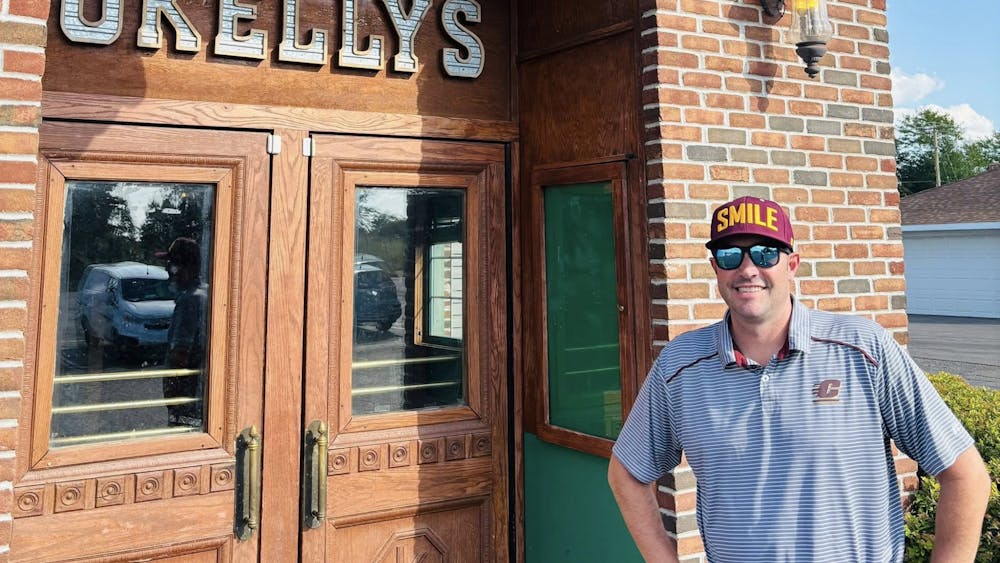The Purr-fect Storm: Stray cat populations increase following pandemic order
Misty Beckwith was headed to work during the January cold when she noticed two kittens in the road - one deceased and the other one frostbitten with a broken tail.
Beckwith decided to take the kitten in as a foster cat and added it to the many cats she looks after in her home.
"If I don't take them in, then what am I going to do?" she said. "They're going to die in the cold."
Located on East Broadway Street, Karma Kat Cafe rescues cats daily while also providing a temporary communal home until they are adopted. Beckwith is the owner. She said the cafe is in "cat crisis" due to the number of people not spaying or neutering.
As a result, Beckwith's business has been flooded with strays. The decision to take them in or not is becoming increasingly difficult.
“Crisis means there are not enough homes, and these animals are dying out there because there’s nobody to take them,” Beckwith said.
However, Beckwith isn't combating this issue alone. Many other rescues, shelters and animal clinics in the Mount Pleasant area are facing the same battle.
Last summer, the state of Michigan passed Executive Order 2020-34 - temporarily deeming neutering as non-essential due to the COVID-19 pandemic.
Anna Chrisman, media manager of Michigan Humane, said a lot of their services such as sterilization and their Trap-Neuter-Return program (TNR) were suspended during the course of the pandemic due to the executive order.
"It impacted all veterinary clinics," Chrisman said.
That order was rescinded May 28, 2020, but the effects are still felt in communities like Mount Pleasant battling large stray cat populations. As a result, many animal workers feel like they are playing catch up.

Animal Workers are Feeling the Struggle
Karma Kat's capacity was 25 cats prior to last summer but rose to 70 this fall – doubling operation costs, Beckwith said. Most recently, adoptions have increased meaning capacity is back down to 45 cats.
“We can’t keep up. There are not even enough veterinarians in the state of Michigan to keep up with the cat care right now,” Beckwith said. “It’s just out of control.”
Amanda Tillotson, executive director of the Humane Animal Treatment Society (HATS), said they receive a substantial amount of phone calls every day. They come from feline owners or those who have found cats wandering around town and want to surrender them.
In 2021, HATS took in a total of 404 felines, while housing an average of 70. Prior to managing its intake in 2019, it housed upwards of 200 felines. HATS had to consistently euthanize to make space.
"Injured, sick or at-risk cats receive top priority for immediate intake. All others are placed on a waiting list," Tillotson said. "Managing our intake allows us to reduce overcrowding and ensures each cat receives quality care...Most importantly, we are no longer euthanizing healthy, friendly cats simply to make space."
When spring is around the corner, so is kitten season. This is when populations are at their highest, therefore, Michigan Humane has found that it is not unusual to care for 500 to 800 animals.
Tillotson said cat overpopulation is an ongoing battle. It is not a new crisis, or a problem that can be solved overnight. The best way to manage this ongoing issue is through spaying and neutering cats.
Beckwith said local veterinarians have been deferring people to Karma Kat Cafe because they are overwhelmed.
"We, like many other places... (are noticing) a nationwide veterinary shortage," Chrisman said. "So we're also combating that -- having enough doctors and everything to perform all of the surgeries now that are extensively backed up."
Beckwith expects the “overwhelming” cat crisis is also deteriorating the mental health of veterinarians and animal rescue workers.
“I think the average (animal) rescue worker lasts five to seven years… before quitting and just not being able to handle it,” she said. “That’s why you see veterinarian suicides are very high. People in (animal) rescue (show) suicides are extremely high as well."
According to a study done by Centers for Disease Control and Prevention (CDC) in 2019, veterinarians in the U.S. are at a high risk of suicide, especially within the last three decades.
“I’m not ready to give up,” Beckwith said. “Are there days when I want to? Absolutely. It’s really hard when you hold a kitten, and it dies in your hands."

Terragon sits by himself Tuesday, Feb. 8 in the cat cages near the entrance of the Humane Animal Treatment Society.
Spaying and Neutering is Everything
Cats are able to begin reproducing when they reach six months. This presents an issue when unfixed cats are let outdoors and reproduce with strays or other cats.
"It's essentially throwing fuel on the fire," Tillotson said. "If every community diligently fixed outdoor cats roaming their neighborhood, as well as their own pets, we would start seeing a significant change...This is a community problem that will take a community wide effort to resolve."
Chrisman said it is important for animal caretakers to have the sterilization conversation with their local veterinarians in order to prevent adding to the population of cats, and for the animals' well-being.
"We encourage sterilization for all companion animals because that way you avoid not only unwanted litters, but several health issues that can come up for unsterilized animals as well," Chrisman said. "Certain types of cancers, infections, that sort of thing that can happen."
Spaying and neutering is the only proven way of reducing feline overpopulation. The process not only combats health issues, but can also prevent male cats from spraying, roaming and being aggressive.
Trap-Neuter-Return programs (TNR) have added progress to battling the cat crisis. These programs essentially allow people that have found strays to bring them into clinics and have the cat spayed and neutered.
Besides controlling the cat population, TNR has ultimately reduced shelter admissions and operating costs, allowing there to be space for other cats to be adopted.
TNR also leaves a positive impact on animal control and shelter workers due to the lack of harm being enforced against cats.

Ronda hangs her paws out of her cage Tuesday, Feb. 8 in the cat room at Humane Animal Treatment Society.
Local Resources are Here to Help
In order to combat this crisis, there are services available to the public as well as affordable adoption options provided by local shelters, rescues and clinics.
Beckwith said proceeds from the public fund Karma Kat Cafe's medical bills, overhead fees and employee income.
“My goal here was just to make sure we are making enough money to sustain ourselves and keep the cats having quality care,” Beckwith said.
The cafe is open to visitors and adoptions - providing a safe space for those that can't have a cat or are debating the responsibility.
People can visit the cafe Monday through Saturday from 1 p.m. to 7 p.m. and Sunday from 1 p.m. to 5 p.m. There is a $10 fee for the public, and $8 fee for students.
To adopt from Karma Kat Cafe, there is a $70 fee and a 24 to 48-hour processing period to ensure the home is right for the cat.
For low-cost spay and neuter operations, the Humane Animal Society provides a clinic that is available for all community members regardless of income or residence.
Michigan Humane is hosting its upcoming primary program February through October called One Health in order to provide appointment-based events that help people get their animals sterilized, vaccinated and checked out for any other health issues.
Michigan Humane has a TNR program that is readily available for those that stumble across feral cats. To learn more information about their TNR services and One Health, call Michigan Humane at 866-HUMANE.
“I know there are a million cats, but to me every one of their lives is important and I don’t know how you value one over another,” Beckwith said. “How do I have the right to say yes to that one living, and that one not (living)?”

Emily Shaw pets a cat Monday, Jan. 24 at Karma Kat Cafe.







